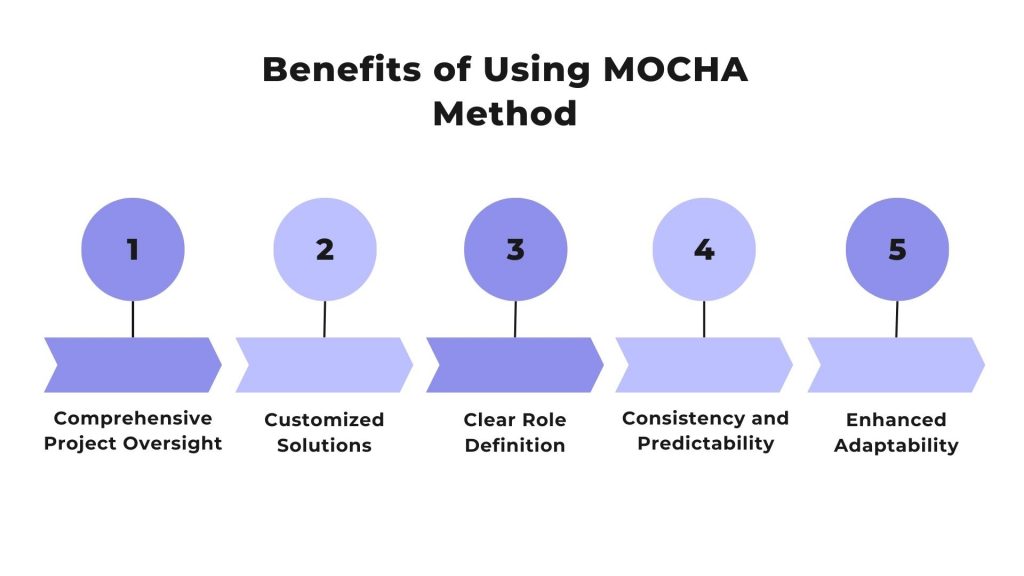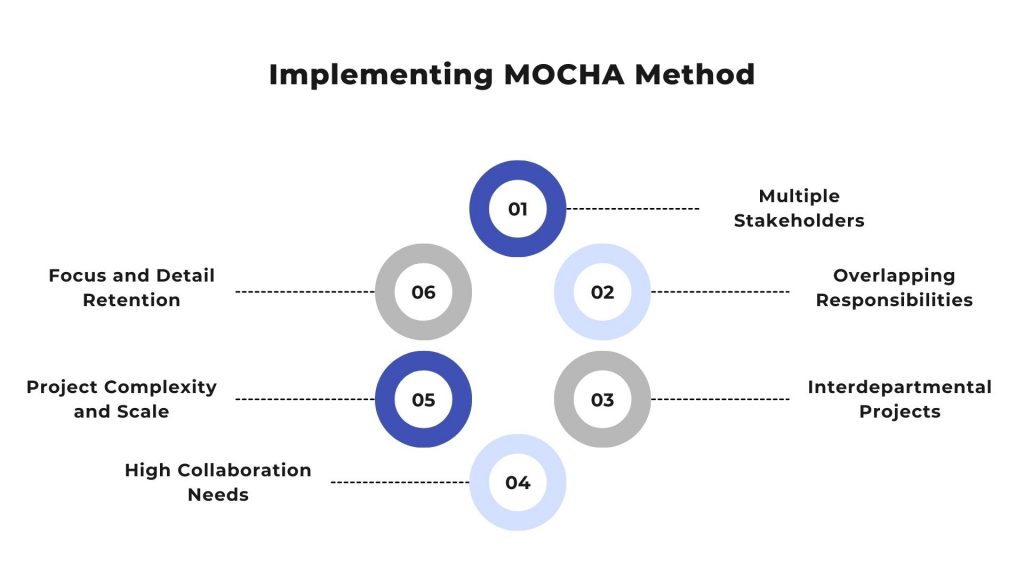
The MOCHA Project Management Method framework has emerged as a revolutionary approach, enhancing project efficiency and success. MOCHA stands for Manager, Owner, Consultant, Helper, and Approver, each role contributing to a structured and collaborative project environment. By clearly defining responsibilities and fostering a culture of accountability and teamwork, MOCHA enables project teams to streamline decision-making, minimize conflicts, and maximize resource utilization.
Implementing MOCHA improves project outcomes and aligns projects with strategic objectives, ensuring higher stakeholder satisfaction. As industries continue to evolve, the adaptability and effectiveness of the MOCHA framework make it an invaluable tool for project managers. This blog explores the complexities of the MOCHA approach, highlighting its benefits, best practices, and real-world applications, providing insights into how it can transform your project management practices.
Table Of Contents
- What is the MOCHA Project Management Method?
- What are the Benefits You Get Using MOCHA Method?
- Early Signs Indicating the Use of MOCHA Method in Project Management?
- When to Implement MOCHA Project Management Method?
- Best Practices to Implement MOCHA Effectively
- Real World Examples of MOCHA
- Conclusion
What is MOCHA Project Management Method?
The MOCHA Project Management Method is a framework that helps define the distinct responsibilities within a project team. Organized into five key roles—Manager, Owner, Consultant, Helper, and Approver (MOCHA)—this method spells out who is responsible for what, aiding in the clear delegation and execution of tasks.
MOCHA is particularly beneficial in creative projects where roles often overlap and boundaries are less defined. It outlines these roles, thereby reducing confusion and potential interpersonal tensions that arise from unclear ownership of decisions or tasks. While MOCHA is not a standalone project management style or methodology, it is a versatile framework that complements various project management approaches by providing clear, structured language to define team roles.
What Does MOCHA Stand For in Project Management?
The MOCHA framework outlines specific responsibilities within a project team to enhance execution and ensure success. Here, we explore the importance and function of each designated role, highlighting how they contribute to efficient project management.
- Manager: The manager is in charge of the overall success of the project. They set the goals, create a plan, and manage resources. The manager is also responsible for keeping the project on track and resolving any issues
- Owner: The owner is responsible for delivering the project’s final product or service. They work with the manager to develop the project plan and identify needed resources. The owner is also in charge of ensuring that the project goals meet the stakeholders’ requirements
- Consultant: The consultant provides expertise and advice to the project team. They may be involved in all aspects of the project, from planning to execution. Consultants can help the team overcome challenges and identify opportunities
- Helper: The helper performs tasks and activities as assigned by the manager or owner. They may be involved in any aspect of the project, from data entry to testing. Helpers are essential to the success of any project, as they free up the manager and owner to focus on more strategic tasks
- Approver: The approver reviews and approves project deliverables. They may be a stakeholder, such as a client or manager, or an internal expert. They may be stakeholders, such as clients, managers, or internal experts. Approvers ensure that the project deliverables meet the required standards and quality
What are the Benefits You Get Using MOCHA Method?
MOCHA Project Management offers numerous advantages that can transform how teams handle projects. This section highlights the key benefits, from enhanced efficiency and improved collaboration to risk mitigation and increased stakeholder satisfaction, demonstrating how MOCHA can significantly elevate project outcomes.
1. Comprehensive Project Oversight
The MOCHA method provides project managers with a holistic view of the project. It consolidates resources and aligns them with the project’s mission, agility, company culture, and goals. This comprehensive approach improves project effectiveness and management.
2. Customized Solutions
Recognizing that each project has unique needs and dynamics, MOCHA allows for a tailored approach. By structuring roles and responsibilities, it adapts to specific project constraints, enhancing the potential for successful outcomes.
3. Clear Role Definition
MOCHA clearly defines the roles and responsibilities of all team members and stakeholders. This clarity ensures that everyone knows exactly what they are responsible for, facilitating more efficient follow-ups and quicker resolution of issues.
4. Consistency and Predictability
The MOCHA method fosters consistency throughout the project management process by providing a set of best practices, templates, and guidelines. This leads to more predictable results, reduced risks, and better control over project variables.
5. Enhanced Adaptability
A well-defined project management culture, as fostered by MOCHA, enhances adaptability. It ensures that all team members are aware of their roles, making it easier to address and resolve issues promptly. This adaptability is crucial for adjusting to changes and challenges during the project lifecycle.
Early Signs Indicating the Use of MOCHA Method in Project Management
Identifying the below early signs can help you determine whether MOCHA Project Management is a suitable approach for your projects. If you recognize several indicators in your project environment, consider adopting MOCHA to enhance your project management practices.
Certainly, here are some early signs that indicate the use of MOCHA Project Management:
- Frequent Changes in Project Scope: If your projects often experience evolving requirements and scope changes, MOCHA’s adaptability can help manage these shifts effectively
- Complex and Uncertain Environments: In industries with high uncertainty, like technology or innovation-driven sectors, MOCHA’s flexibility ensures that you can adjust to unforeseen challenges
- Need for Faster Project Delivery: When timelines are tight, and you require quick project execution, MOCHA’s streamlined approach and emphasis on efficiency can expedite project completion
- Emphasis on Stakeholder Engagement: If stakeholder involvement and satisfaction are crucial, MOCHA’s communication strategies foster transparency and collaboration
- Desire for Agile Project Management: If your organization seeks an agile project management approach, MOCHA’s adaptability and responsiveness make it a suitable choice
- Resource Limitations: When resources are constrained, MOCHA can help maximize their utilization through efficient resource management
- Desire for Innovation: If your projects require innovative solutions and creative problem-solving, MOCHA’s encouragement of adaptability and ingenuity can be beneficial
- Frequent Market Changes: In industries with rapidly changing market conditions, MOCHA equips you to adapt your projects to stay competitive
- Historical Project Delays: If your past projects have experienced frequent delays, MOCHA’s risk mitigation and streamlined approach can help address this issue
- Complex Stakeholder Landscape: When your projects involve multiple stakeholders with diverse interests, MOCHA’s communication strategies can help ensure all parties are informed and aligned
- Desire to Align Projects with Organizational Strategy: If your organization aims to ensure that projects align closely with the company’s strategic objectives, MOCHA’s focus on mission definition is valuable
- Cross-Functional Teams: When your project teams involve members from various departments or specialties, MOCHA’s emphasis on collaboration helps harmonize their efforts
Identifying these early signs can help you determine whether MOCHA Project Management is a suitable approach for your projects. If you recognize several indicators in your project environment, consider adopting MOCHA to enhance your project management practices.
Professionals should consider enrolling in a project management courses to succeed in MOCHA Project Management, as this methodology places a strong emphasis on adaptability, streamlined efficiency, and effective collaboration.
MOCHA’s risk mitigation strategies and commitment to innovation ensure projects meet objectives and result in higher stakeholder satisfaction.
When to Implement MOCHA Project Management Method?
The MOCHA Project Management Method is particularly beneficial in scenarios where clarity of roles and structured communication are crucial. Here are some specific situations when you might consider implementing the MOCHA framework:
-
Multiple Stakeholders
When your project involves multiple external stakeholders, the MOCHA method is invaluable. It clearly defines roles and responsibilities, enhancing accountability and ensuring that each participant’s contributions are understood, which is particularly beneficial in projects with many collaborating parties.
-
Overlapping Responsibilities
MOCHA can bring much-needed clarity to projects that initially exhibit overlapping responsibilities and tasks. Defining specific roles prevents team members from stepping on each other’s toes or dividing duties inefficiently, which is crucial for maintaining harmony and effectiveness in team dynamics.
-
Interdepartmental Projects
MOCHA is ideal for projects that require the integration of different teams, functions, or departments. Establishing clear roles from the outset helps all participants quickly align on objectives and methods, reducing the potential for conflict and confusion as the project progresses.
-
High Collaboration Needs
For projects that demand ongoing, intense communication between parties, MOCHA provides a framework that reduces uncertainty about who is responsible for which tasks. This structure is particularly helpful in collaborative environments where clear communication channels are vital for success.
-
Project Complexity and Scale
When projects grow in complexity or scale, maintaining an organized approach becomes challenging. MOCHA helps manage these challenges by providing a clear roadmap and defined roles, enabling team members to navigate complex tasks more effectively and ensuring that all project aspects are adequately covered.
-
Focus and Detail Retention
In long-term or intricate projects where team members might lose focus or overlook details, MOCHA can reorient the team. By assigning specific roles like Manager, Owner, Consultant, Helper, and Approver, it ensures that responsibilities are clear and that each team member has a defined area of focus, which can significantly reduce errors and oversight.
 Best Practices to Implement MOCHA Effectively
Best Practices to Implement MOCHA Effectively
Implementing the MOCHA Project Management Method effectively requires a well-thought-out approach that maximizes the framework’s benefits. Here are some best practices to ensure successful implementation:
- Define Roles Clearly: Start by clearly defining each role within the MOCHA framework—Manager, Owner, Consultant, Helper, and Approver. Ensure every team member understands their responsibilities and the expectations associated with their role. This clarity from the outset prevents confusion and sets a solid foundation for the project.
- Set Clear Goals and Objectives: Clearly articulated goals and objectives are crucial. Ensure every team member knows what they are working towards and understands how their role contributes to the broader project goals. This alignment helps maintain focus and drive throughout the project lifecycle.
- Adopt Project Management Tools: Modern project management tools enhance coordination and track progress. Tools like monday.com or WP Project Manager Pro can facilitate task management, communication, and progress monitoring, keeping everyone in sync and informed.
- Foster Open Communication: Create an environment where open and honest communication is encouraged. Implement systems that make it easy for team members to provide feedback and share ideas. This could include in-built messaging systems in project management software, regular check-ins, or dedicated channels for project discussions.
- Regular Check-ins and Status Meetings: While keeping meetings to a minimum, regularly scheduled check-ins can help gauge project progress and promptly address any issues. These meetings should be agenda-driven and focused to ensure they are effective and respect everyone’s time.
- Celebrate Milestones: Recognize and celebrate successes, no matter how small. This not only boosts morale but also keeps the team motivated and engaged. Acknowledging achievements helps reinforce the value of everyone’s contributions to the project.
- Develop a Backup Plan: Always have structured plans in place. Projects can face unexpected challenges, and having backup plans ensures that you can pivot and continue making progress without significant delays.
- Continuous Learning and Adaptation: Embrace a mindset of continuous improvement. After each project phase or upon completion, gather insights on what worked well and what didn’t. Use this feedback to refine the MOCHA implementation in future projects, enhancing efficiency and effectiveness over time.
Real World Examples of MOCHA
Here are a few real-world examples of organizations that have successfully used MOCHA Project Management:
Organizations like Google, Amazon, and Microsoft have effectively utilized the MOCHA framework project management to streamline complex projects and boost productivity. This section explores how these industry giants leverage MOCHA for project success and innovation.
- Google: Google uses MOCHA to manage its complex and ever-changing software development projects. For example, Google used MOCHA to manage the development of its Chrome web browser. Google also uses MOCHA to manage its internal projects, such as its employee performance management system
- Amazon: Amazon uses MOCHA to manage its global supply chain and e-commerce platform. For example, Amazon used MOCHA to manage the launch of its Prime Day shopping event. Amazon also uses MOCHA to manage its internal projects, such as its product development process
- Microsoft: Microsoft uses MOCHA to manage its Windows operating system and its Office suite of productivity software. For example, Microsoft used MOCHA to manage the development of Windows 11. Microsoft also uses MOCHA to manage its internal projects, such as its employee training programs
Conclusion
MOCHA Project Management Method provides a clear and effective framework for defining roles within a project team. By distinguishing the responsibilities of Managers, Owners, Consultants, Helpers, and Approvers, MOCHA enhances project efficiency, improves communication, and ensures success across various project types. This method is particularly valuable for projects that involve complex team dynamics or where clear role definition is crucial. MOCHA helps in role assignment and fosters a collaborative environment that promotes productivity and detailed management of project elements.
For professionals looking to deepen their understanding of project management techniques or to gain certification, Invensis Learning offers a comprehensive Project Management Professional (PMP) course. These courses equip you with essential project management skills and knowledge. Enroll now to explore our PMP course and advance your project management career.



 Best Practices to Implement MOCHA Effectively
Best Practices to Implement MOCHA Effectively











